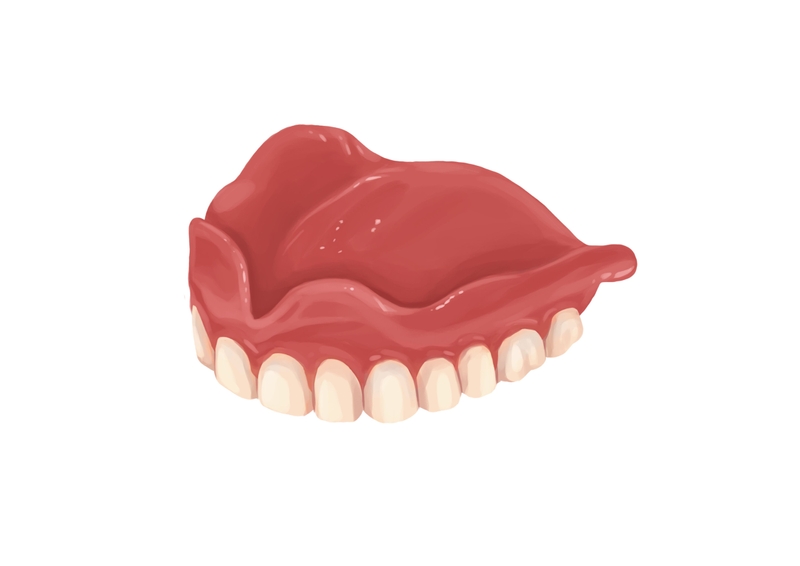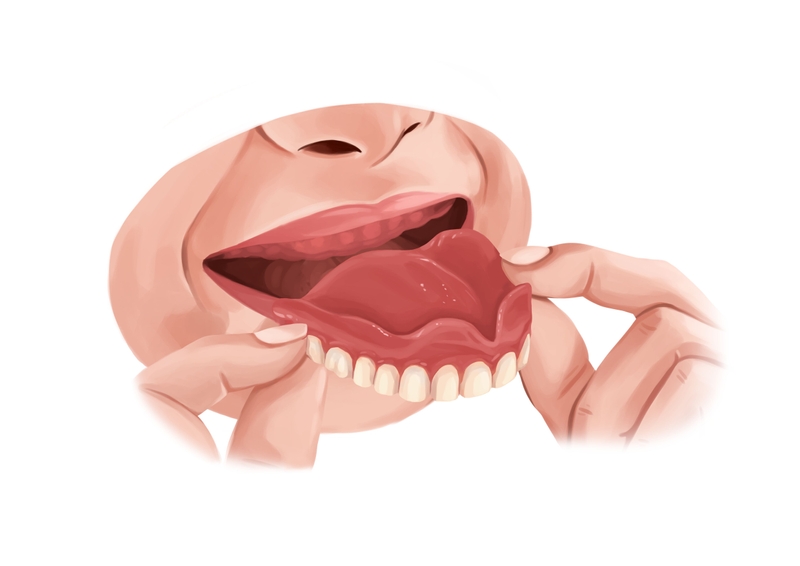- Eating with dentures takes some practice and a period of adjustment, especially with hard or chewy foods.
- Soft foods are easier to eat with dentures, but it is important to maintain a healthy, balanced diet.
- You should avoid hard and sticky foods, as well as drinks that may discolor the dentures.
Use Authority Dental to find and book a cheap denture dentist in your city, or sign up for a dental discount plan and save big on all dental procedures, including dentures.
Are you worried about eating with new dentures for the first time? Here's everything you need to know.
How to eat with dentures?

Picture by Authority Dental under CC 2.0 license
Eventually, you will be able to eat almost everything you could when you had your natural teeth. However, it is best to start using your dentures slowly to avoid sore spots and mouth sores. Everyone handles the transition to dentures differently, so use this as a guide, but go at whatever pace is comfortable for you. Do not rush the process; you might end up frustrated and possibly even in pain.
If the discomfort persists for an extended period, you may need to reline or replace your dentures.
Start with soft foods
You should start by trying softer food. This is especially true if you also had recent tooth extractions, as is the case with immediate dentures. Sore spots are inevitable, and you will likely need your dentist to make some adjustments to your dentures. However, sticking to foods like smoothies, mashed potatoes, pudding, apple sauce, yogurt, oatmeal, and soup broths is a good idea to start.
Chew on both sides
One of the most significant adjustments you will need to make is learning to chew on both sides of your mouth. Most of the time, we chew our food with one side of our mouth. However, if you do that, your denture will rock and probably become dislodged. The rocking movement will cause whatever suction (from your palate) or adhesion to come loose. If you can chew on both sides, it helps to spread the biting forces out more evenly.
Limit using front teeth
Unless you have implant-retained dentures, you should not use your front teeth to bite into foods. This will also cause the front part of your denture to take all the pressure, which could dislodge the back part of it. You should cut your food into bite-sized pieces and place them towards the back of your denture when eating.
Use denture adhesive
Adhesive is a great way to stabilize a loose or ill-fitting denture. It can be used on both lower and upper dentures and will help them stay in place. Be sure to clean the adhesive from your denture every evening before going to bed.
Be patient
It will take practice and patience to get used to eating with your denture. Do not expect to master the skill in one day or even one week. Eventually, though, eating will come just as naturally as it did with your other teeth.
If you had teeth extracted, you should expect the healing process and the adjustment phase to be longer. It may take several weeks for your mouth to adjust to wearing dentures and to alleviate any sharp spots. After an extraction, the bone undergoes remodeling, so it is common to need periodic adjustments for the first few months.
Lee explains: "I often use this analogy: your natural teeth are like a set of sharp knives anchored firmly into a cutting board. They are incredibly efficient at tearing and grinding. Dentures, on the other hand, are more like two smooth stones."
"You cannot tear with them; you have to learn to crush," he suggests.
Dietary suggestions for denture wearers

Picture by Authority Dental under CC 2.0 license
You can eat almost anything with dentures, as long as you do so in the right way. However, certain foods are better for dentures, while others are best avoided.
What can you eat
You can eat a wide variety of soft foods with your denture. The important thing is to ensure that you are eating a proper diet rich in good nutrition. We have already mentioned some great foods to start with, but as you get used to your dentures, you can add more foods to the mix. Try foods such as:
pasta,
rice,
soup with soft meats and vegetables,
soft bread,
fish (no skin),
cooked beans,
slow-cooked, tender meats,
ground meats,
protein spread (like peanut butter),
ripe fruits,
cooked vegetables.
Foods to avoid
To ensure your dentures last an extended time, it is best to avoid certain foods. This includes hard and sticky foods, which could cause your denture to crack or break. Try to avoid eating foods from this list:
nuts,
sticky candy,
popcorn,
steak.
You should also avoid beverages that could stain your dentures, like coffee, dark teas, and red wines. However, if you cannot go without those beverages, just be sure to drink them in one sitting and rinse your dentures afterward. If your dentures become stained, there are cleaning solutions available to remove the stain and restore their original color.

FAQ
Why is it so hard to eat with dentures?
It can be challenging to eat with dentures due to soreness and the overall unfamiliarity of the appliance. At first, you may bite your cheeks, salivate excessively, or even gag. Some people find it more challenging to eat with dentures than others, and those with a severe gag reflex may not be able to use a denture at all.
How long till you can eat solid food after getting dentures?
You should wait at least 3-4 weeks to eat solid food with your dentures. You may need to wait longer if you had multiple extractions or are still experiencing sore areas.
Can you taste food with dentures?
You can still taste food with a denture, but probably not as much as you could without one. If you have a maxillary denture that covers your palate, it will cover all the taste buds you have on the roof of your mouth. However, if you have a U-shaped maxillary denture, your taste will not be affected.
Harry Lee, DMD
One of the first questions my new denture patients ask is, “Will I ever be able to eat a steak again?” The honest answer is yes, eventually, but you will have to relearn how to chew thoroughly. It is a skill that requires much patience.